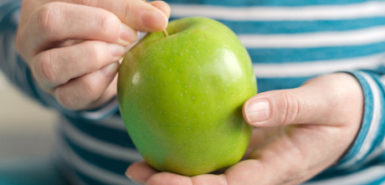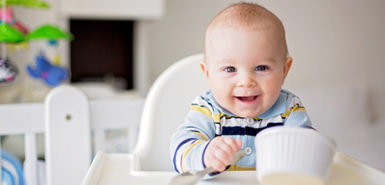
Maybe you’ve heard someone say, “Oh, just give your baby some cereal and they’ll sleep through the night.”
Is this true? We know that breast is best for baby, but for how long? What is the recommendation?
When my oldest child was a baby, experts recommended starting solids at 4 months old. I breastfed him, but I was so excited to start food. Why so excited? Even now, I don’t know.
At his four-month checkup, his doctor said it was time. So, I started with cereal.
The American Pediatrics Association and the World Health Organization both recommend breastfeeding exclusively for the first six months.
I followed these recommendations with my other children.
In fact, my last two babies didn’t even have solid food until they were about 8 months old, although this was partially because they weren’t interested yet and I also knew how messy solid food can be.
Breastfeed longer
The only thing recommended in the first six months is to add vitamin D—but you should first talk to your baby’s doctor about this.
The pediatrics association recommends mothers continue breastfeeding for a year, and then after that continue as long as mom and baby desire. WHO recommends breastfeeding for at least the first two years.
I’ve mentioned in other posts that several of my children breastfed until they were about 24 months old.
So, the answer to that question we started with is, “No.” Don’t feed your babies cereal before the recommended age, even to help them sleep.
Why might they sleep with the cereal? We know it sits in their stomach and takes longer to digest, which could lead to longer sleeping. But this isn’t best for baby.
The pediatrics association also tells us that babies who eat solids before they’re 4 months old have increased obesity in childhood.
You may wonder why this timeframe has changed over the years.
In part, it’s because we now know that babies who are breastfed until they’re at least 6 months old are less likely to be overweight. With a large concern over childhood obesity, this is yet another reason to breastfeed—and longer.
The pediatrics association also tells us that breastfeeding for at least the first six months shows “a reduction of 40 percent in the incidence of Type 2 diabetes mellitus … reflecting the long-term positive effect of breastfeeding on weight control and feeding self-regulation.”
Food for thought
When you do start to introduce solid food to your baby, here are some important recommendations to keep in mind:
- Breastfeed baby first, then offer the food.
- Start with only a few teaspoons of food. They aren’t supposed to eat the whole jar at first!
- When you are starting solids, try one food at a time and give it several days so you can watch for reactions. My oldest reacted to peaches—he got a red ring around his mouth when he ate them. He did outgrow this and he now loves peaches. Allergies can occur from minutes afterward to days. Gerber Products Company tells us symptoms of a reaction are “a skin rash, diarrhea, congestion or vomiting.”
- Research tells us it may take 10 attempts before baby likes the taste.
- There are different thoughts on what should be started first—cereal, fruit or veggies. Be sure to talk with your baby’s health provider about their recommendation.
- Babies should be offered a variety of foods with different flavors and textures.
- Continue to feed baby fruits and vegetables, even after introducing food that baby feeds himself.
- It’s also recommended that parents learn when their baby is full so that the baby is not overfed.
 /a>
/a>
 /a>
/a>
 /a>
/a>